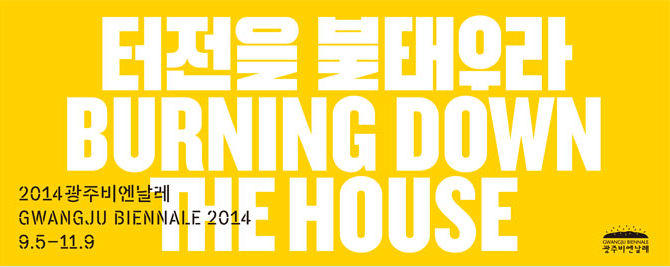Gwangju Biennale

![gwangju-biennale]()
The 10th Gwangju Biennale runs in Korea from 5 September - 9 November 2014, under the theme
Burning Down the House and explores the process of burning and transformation, a cycle of obliteration and renewal witnessed throughout history. It brings together 105 artists from more than 39 countries and will include 35 new commissions, each selected for their relevance to the theme of the Biennale.
Evident in aesthetics, historical events, and an increasingly rapid course of redundancy and renewal in commercial culture, the Biennale reflects on this process of, often violent, events of destruction or self-destruction—burning the home one occupies—followed by the promise of the new and the hope for change. The theme highlights the capacity of art to critique the establishment through an exploration that includes the visual, sound, movement and dramatic performance. At the same time, it recognises the possibility and impossibility within art to deal directly and concretely with politics.
Check out the video introduction (in Korean):
https://www.youtube.com/watch?feature=player_embedded&v=_S_48VuWQT4
Running throughout the duration of the exhibition, both inside the exhibition halls and within specially customized spaces, are new theatrical, dance, and performative commissions by international and Korean artists. Involving more than 400 Gwangju citizens in their realization, these works will provide a constantly changing environment in the exhibition spaces as each day offers a new configuration. During the opening days specially commissioned dance works will take place in the Biennale Halls.
The Opening
Schedule and special performance days include
Simultaneous (Gwangju) by Singapore artist,
Heman Chong.
A special project for the 20th anniversary of the Gwangju Biennale,
Sweet Dew - Since 1980, opened August 8, kicking off three months of city-wide performances, roundtable talks, international lectures and a major exhibition at the Gwangju Museum of Art. The title was taken from a style of Joseon Dynasty-era Buddhist painting, known for its themes of suffering and healing. The project was presented to initiate dialogue ahead of the open of the 10th Gwangju Biennale, reevaluating the city’s past and present, and will continue through November 9.






